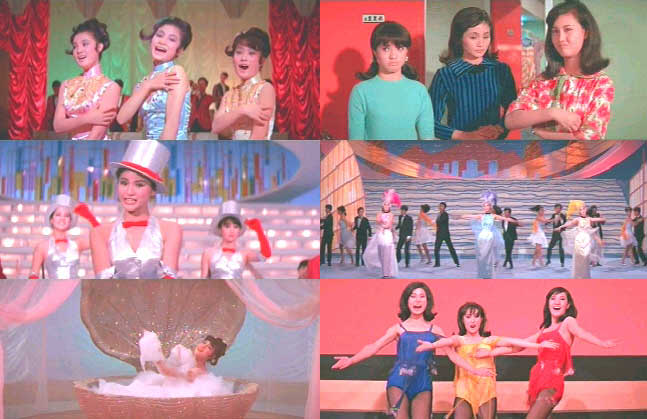

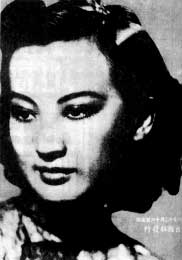
From the late 30’s to the early 50’s two actresses in particular were to exemplify the Shanghai sing-song influence – Zhou Xuan and Bai Guang. In 1937, Zhou exploded on the film scene with “Street Angel” in which she sang a few songs and instantly became a star. Nicknamed “The Golden Voice” she was originally from Shanghai but moved to Hong Kong where she starred in films such as “All Consuming Love”, “Song of a Songstress” and “Orioles Banished from the Flowers”. Unfortunately, her life off screen was not a happy one and a broken marriage and various mangled love affairs led her to a series of breakdowns and she died in a mental hospital at the age of 39 in 1957.
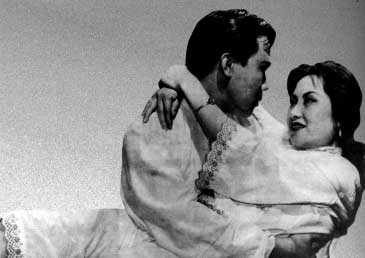
Bai Guang also began her career in Shanghai and later moved to Hong Kong after the war. She claimed that seeing the light emanating from a film projector when she was a child inspired her stage name, which means “White Light”. Known for her sensual image and bad girl femme fatale type of roles in such films as “Blood-Stained Begonia” (1949) and “An Unfaithful Woman”, she picked up the nicknames of “The Magnetic Low Voice” for her singing and “The Bewitching Beauty of all Ages” for her looks. She retired in 1959 and died recently in Kuala Lumpur. Generally, the “musicals” during this period tended to be straight dramas or comedies with songs inserted at various points along the way even if they had little to do with the narrative of the film.
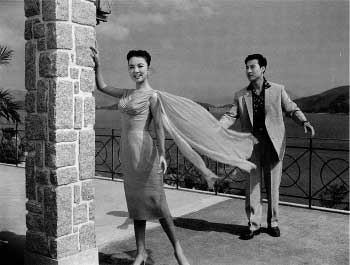
Zhong Qing (Silver Light)
Nearing the end of the 1950’s two other actresses/singers were to bring an entirely new fresh look and feel to musicals. This new wave of musicals was much more upbeat then previously as they shed much of the tragic Shanghai sing-song image and injected the films with a youthful vitality. The songs and narrative also became more integrated and were often used to drive characterization and plot. The film that is credited with beginning this trend was the 1956 Wong Tin-lam directed film ‘Songs of Peach Blossom River” starring newcomer Zhong Qing (Little Wild Cat) who brought enormous energy and spunk to her roles in which she often played a village girl or a farmer’s daughter. She was to star in a number of musicals over the next few years and was very popular even though famed vocalist Yao Li dubbed her singing in most of her films. Zhong was to retire in 1967 after marrying.
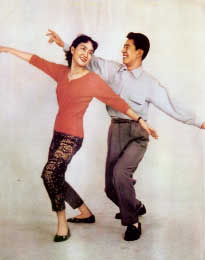
Grace Chang and Peter Chen in "Mambo Girl" (Silver Light)
A year after “Peach Blossom”, Hong Kong musicals struck a new high with the irrepressible and dazzling Grace Chang in “Mambo Girl”. From the very opening scene of Grace joyously singing and dancing to the Cha-cha, the film seemed to be announcing that musicals were different now – they were modern and had pizzazz and Grace had more of it than anyone. No matter what the genre of the film, Grace was expected by audiences to sing at some point during the proceedings and the one film in which she didn’t – “Forever Yours” – bombed at the theaters. Grace also retired after marrying in the early 60’s.
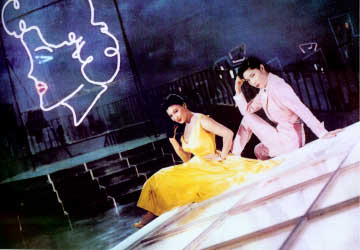
Calendar Girl (Silver Light)
In the 1960’s the musical format continued to evolve – glossy color became common, Hollywood influences were more apparent (though Hollywood from the 40's and 50s), Western styles of music such as the twist and Go-Go music proliferated and ravishing spectacle was the flavor of the day with fabulous eye popping musical numbers. In lavish, lush films such as Calendar Girl, Love Parade, Les Belles and The Dancing Millionairess, Hong Kong audiences were treated to complete fantasy worlds in which everything exploded in color and romance. Soon another influence was to make itself felt in the musical genre as the Shaw Brothers invited Japanese director, Inoue Umetsugu, to make Hong Kong musicals and he brought a deliciously slick pop culture eye to the designs and music. It was the Mandarin studios that primarily drove the contemporary musical, while the Cantonese film industry focused more on Chinese Opera in the 50’s. Later with the popularity of actresses such as Josephine Siao, Connie Chan and the other “Seven Princesses” the Cantonese studios turned to more modern musicals, but they tended to be overshadowed by the much better financed Mandarin ones.
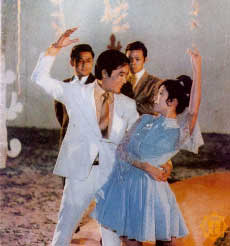
When compared to Hollywood musicals there are a few things that stick out regarding Hong Kong musicals. Like other Hong Kong films of the time, musicals were completely dominated by the female actresses and other than Peter Chen, no men ever really became identified with the genre. This lack of male stars in musicals perhaps impacts another observation – musical numbers tended to focus primarily on the song and the design with most choreography being fairly routine and staid. There just were no dancers with the talent of a Fred Astaire, Gene Kelly, Ann Miller or Cyd Charisse. Most male actors had no desire or ability to dance on screen while most of the actresses did not have a lot of formal training other than perhaps in ballet. This allowed for few opportunities to really let go with creative and exciting dance performances and forced the choreographers to keep the dancing formal, simple and often balletic in style.
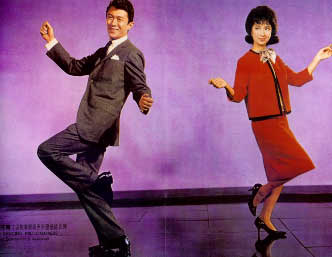
Peter Chen and Betty Loh Tih in Dancing Millionairess (Silver Light)
Hong Kong obviously had no vaudeville/Broadway
traditions and so there was not the in depth training ground for modern
dancing that Hollywood was able to feed off of. Thus Hong Kong’s attempt
to go Hollywood in the 60’s in respect to musicals never really seemed totally
realistic and though the musical numbers often look visually stunning they
were at the same time often somewhat lifeless and non-dynamic. They do of
course make up for this deficiency with some great tunes, strong vocals (usually
dubbed by others), slight but effective dramas and charming comedies – and
most importantly – some of the most charismatic actresses ever who will warm
every bone of your body.
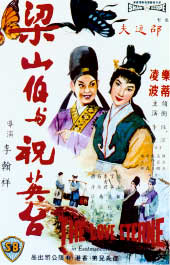
By the early 1970’s the musical began to
fade away – both the contemporary ones as well as Chinese Opera films. In
the 1950’s and 60’s over 700 Cantonese opera films were made and in the 60’s
the Mandarin Huangmei (yellow plum) opera became extremely popular for a
few years, but the huge success of the martial art film and changing taste
in music made the musical format seem out of date. There have been a few musicals
attempted since then, but none have done particularly well at the box office
– though there have been many films with songs being an important part of
the structure such as Rouge (about a sing-song girl), Miracles and Hu-Du-Men.
One might think that with the odd phenomenon in Hong Kong of combining acting
and music careers that musicals would be a natural, but it has yet to happen.




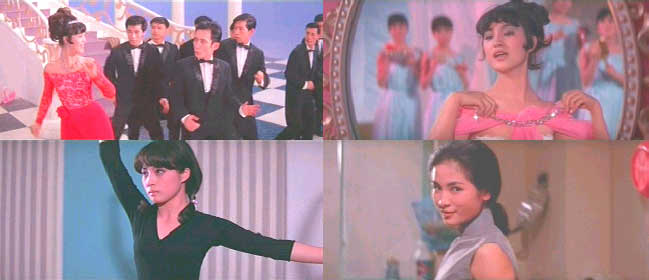
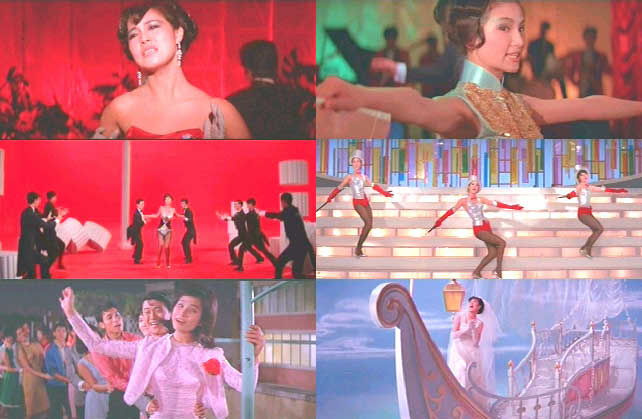
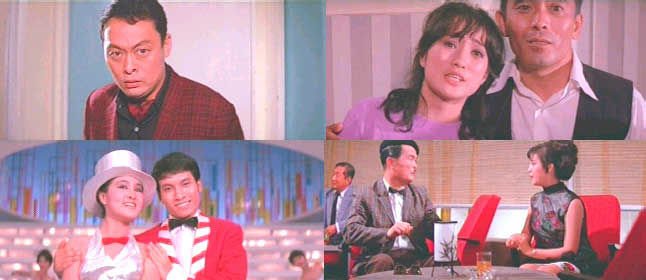
My rating for this film: 8.0
Information/pictures gathered from various resources:
"Silver Light" by Paul Fonoroff
"Hong Kong: The Extra Dimension" by Stephen Teo
"Mandarin Films and Popular Songs – 40’s – 60’s"
from the HKIFF
"Once Upon a Time in China" by Jeff Yang